Toward Freedom Board Member Jacqueline Luqman recently returned from a trip to Venezuela to take part in commemorations for the 20th anniversary of the defeat of the U.S. coup to oust then-President Hugo Chavez. Back in the United States, Jacqueline interviewed Carlos Ron, Venezuela’s Vice-Minister of Foreign Affairs for North America as well as the president of the Simón Bolívar Institute for Peace and Solidarity Among Peoples. They discussed on the Black Power Media YouTube channel the Venezuelan people’s victory over the 2002 coup as well as their continued fight against fascism, the historical struggle against imperialism, and how people outside Venezuela can be in solidarity with the revolutionary process.
Related Articles
Related Articles
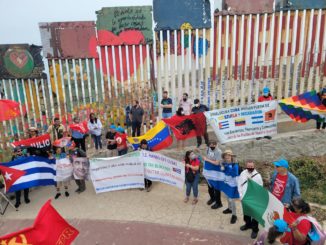
3 Counter Summits Called on Public to Stand Against Biden Administration’s ‘Failed’ Summit of the Americas
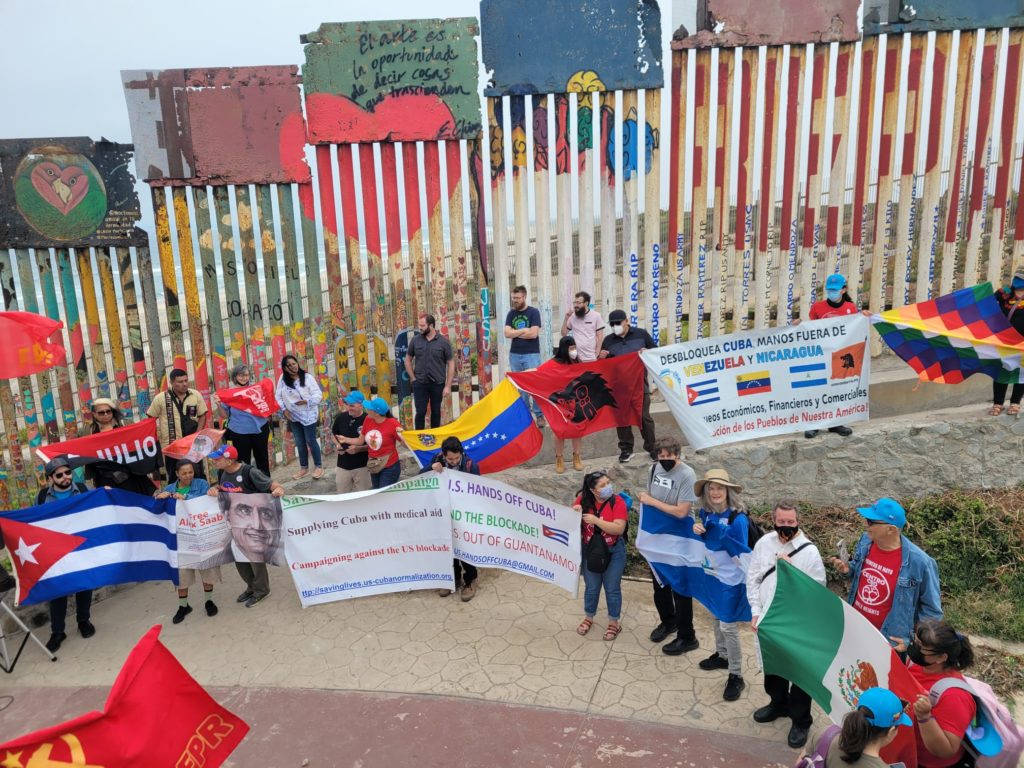
After the Biden administration announced it would exclude Cuba, Nicaragua and Venezuela from participating in the Summit of the Americas—held last week in Los Angeles—organizations based in the United States began collaborating with international organizations to organize counter actions.
Many people on the left had followed the activities of the People’s Summit for Democracy, the well-publicized counter event to the summit the Biden administration hosted. The Summit of the Americas was denounced as a “failure” for not coming up with a plan to address climate change, the debt crisis facing many countries in the Western Hemisphere, as well as increasing inflation and white-supremacist violence in the United States, among other issues.
What some may not know is anti-imperialists held two other counter summits last week: One coalition of mainly Los Angeles-based organizations hosted the Anti-Imperialist People’s Summit of Nuestra América on June 4 as well as a June 8 rally in the city, while another coalition organized the Workers’ Summit of the Americas June 10-12 in Tijuana, Mexico.
The following organizations sponsored the June 4 and June 8 Los Angeles-based anti-imperialist events: Unión del Barrio, Raza Unida Party, Black Alliance for Peace (BAP), United Teachers Los Angeles (UTLA), Frente Sandinista de Liberación Naciónal (FSLN), Socialist Unity Party, American Indian Movement Southern CA (AIM SoCal), Harriet Tubman Center for Social Justice, Bayan SoCal, Palestinian Youth Movement, Witness for Peace Southwest, Progressive Asian Network for Action, Farabundo Martí National Liberation Front (FMLN), Los Angeles Movement for Advancing Socialism (LA MAS), Canto Sin Fronteras, Zapata-King Neighborhood Council and Guardianes de la Tierra.
Meanwhile, more than 250 organizations involved in liberation struggles convened and/or endorsed the People’s Summit.
The Workers’ Summit of the Americas in Tijuana was the only event Cuban, Nicaraguan and Venezuelan officials could attend. The following organizations sponsored the event: Alliance for Global Justice (AFGJ), Coordinadora Nacional de Trabajadores de la Educación de Baja California (CNTE-BC), International Action Center (IAC), Plataforma de la Clase Obrera Antiimperialista (PCOA), Unión del Barrio, 1199 SEIU United Healthcare Workers East, Black Lives Matter – Oklahoma City, Freedom Road Socialist Organization (FRSO), Central de Trabajadores de Cuba (CTC), CODEPINK, Central Bolivariana Socialista de Trabajadores (CBST), Boston School Bus Drivers Union – Local 8751, Fire This Time (FTT), University of Tijuana, Movimiento Magisterial Popular Veracruzano, Federación Bolivariana de Trabajadores del Transporte – Sectores Afines y Conexos (FBTTT), Council on Hemispheric Affairs (COHA), FUNDALATIN, Interreligious Foundation for Community Organization (IFCO), Task Force on the Americas and Centro Community Service Organization.
Both the People’s Summit for Democracy and the Workers’ Summit of the Americas issued declarations (here and here). The Tijuana summit’s declaration announced plans for constituting a committee to convene annual meetings, among other actions.
Below are videos that can be viewed to learn more about each event:
- Anti-Imperialist People’s Summit of Nuestra América, June 4
- Black Alliance for Peace panel, “Defending Our Americas: Building Resistance to Imperialism and Militarism,” June 5
- Anti-Imperialist Rally, June 8
- People’s Summit for Democracy livestreams, June 8-10
- Workers’ Summit of the Americas, June 10-12
Moments from the anti-imperialist rally on Wednesday that denounced Biden as his caravan drove past, so he could make a speech to the Summit of the Americas. Featuring @dedanwaciuri, @blackleftaf and BAP-SoCal. #summitoftheamericas #peoplessummit22 #losangeles #biden pic.twitter.com/fxX6hirCCV
— Black Alliance for Peace (@Blacks4Peace) June 11, 2022
La Cumbre de las y los Trabajadores de Nuestra América inicia su jornada con participación de @CubaCentral #Cuba, @cbolivariana de #Venezuela, y #Nicaragua así como el sindicalismo #Mexicano @SMEexterior pic.twitter.com/xCIiZOXSSl
— Unión del Barrio (@UniondelBarrio) June 10, 2022
Anti-imperialist organizations taking part in the Workers’ Summit of the Americas gather at the Mexico-US border in solidarity with the Sandinista, Cuban, and Bolivarian Revolutions and send a message of repudiation of the US/OAS Summit of the Americas. pic.twitter.com/RF5XcFsppH
— Kawsachun News (@KawsachunNews) June 12, 2022
Julie Varughese is editor of Toward Freedom.
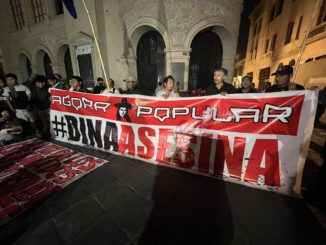
‘Coup Regime Won’t Last Without Southern Provinces,’ Says Observer of Unrest in Peru
Kawsachun News was recently in Desaguadero, Peru, to speak to participants of the general strike against the parliamentary coup that took place against ousted President Pedro Castillo.
Peoples Dispatch reported state forces killed 17 people January 9 in Juliaca, Peru, bringing the total during this unrest to 46 deaths, as of the last available press reports.
Clau O’Brien Moscoso, a member of the Black Alliance for Peace Haiti/Americas Team, is in Peru reporting from the ground. She spoke to Kawsachun News on January 12.
Here is some of her video documentation of the national strike.
BAP Haiti/Americas Team member Claudia O'Brien Moscoso (@PiolinSghost) has been in the streets of Lima with the masses of #Peru's people, who have been protesting the parliamentary coup of @PedroCastilloTe. Check this thread for her documentation. https://t.co/DgNJcLgN46
— Black Alliance for Peace (@Blacks4Peace) January 6, 2023
TF Board Secretary Jacqueline Luqman also interviewed Moscoso January 12 on Black Power Media’s “Remix Morning Show.”
Julie Varughese is editor of Toward Freedom.
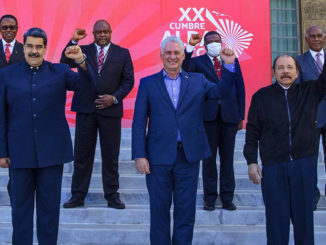
U.S. Sanctions on Russia Over Ukraine Also Target Venezuela, Nicaragua, Cuba
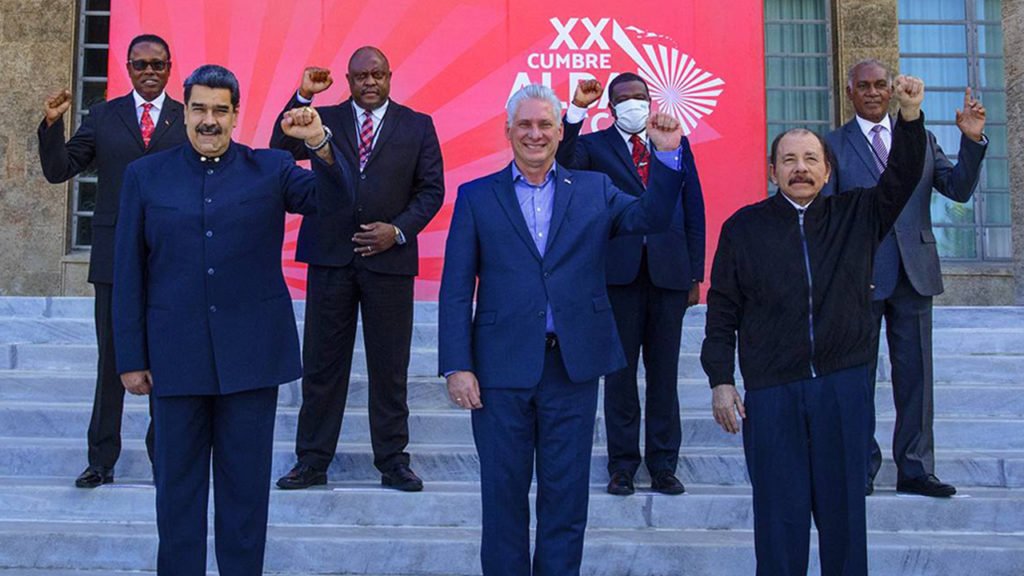
Editor’s Note: This article was first published by Multipolarista.
U.S. President Joe Biden’s top Latin America advisor has admitted U.S. sanctions against Russia over Ukraine intentionally seek to hurt Venezuela, Nicaragua and Cuba.
The United States imposed a series of harsh sanctions on Russia following Moscow’s recognition of the independence of the Donetsk and Lugansk People’s Republics in Ukraine’s eastern Donbas region on February 21, and its subsequent military intervention in Ukraine on February 24.
Juan S. González, Biden’s special assistant for Latin America and the U.S. National Security Council’s senior director for the Western Hemisphere, made it clear that these coercive measures against Russia are also aimed at damaging the economies of Venezuela, Nicaragua and Cuba.
Venezuela, Nicaragua and Cuba have socialist governments that Washington has long tried to overthrow. All three currently suffer under unilateral U.S. sanctions, which are illegal according to international law.
Former U.S. National Security Advisor John Bolton, an architect of the Iraq War, referred to these three Latin American nations as the so-called “Troika of Tyranny.”
Biden’s advisor González did an exclusive interview with Voz de América, the Spanish-language arm of the U.S. government’s propaganda outlet Voice of America, on February 25.
Voz de América published his comments in a report titled, “U.S. sanctions on Russia will impact Venezuela, Nicaragua, and Cuba, White House estimates.”
“The sanctions against Russia are so robust that they will have an impact on those governments that have economic affiliations with Russia, and that is by design,” González explained.
“So Venezuela is going to start feeling that pressure. Nicaragua is going to feel that pressure, along with Cuba,” he added.
Biden’s Latin America advisor noted that Washington has imposed sanctions on 13 top financial institutions in Russia, including some of the largest in the country. He proudly said that these coercive measures will, “by design,” harm other countries that do a lot of trade with the Eurasian power.
González also used his interview with the U.S.-funded Voz de América to reiterate Washington’s call for regime change against these three socialist governments in Latin America.
His comments were reported by the independent Bolivia-based news website, Kawsachun News.
Biden advisor: U.S. sanctions against Russia are 'designed' to impact Venezuela, Nicaragua and Cuba. pic.twitter.com/Zbqg3mgB2N
— Kawsachun News (@KawsachunNews) February 26, 2022
Venezuela, Nicaragua and Cuba Stand with Russia Against U.S. and NATO
Venezuela, Nicaragua and Cuba have stood with Russia against NATO expansion and Western military encirclement.
President Nicolás Maduro said that Venezuela “laments the mockery and breaking of the Minsk agreements by NATO, promoted by the United States of America.”
Maduro stressed that Washington and NATO bear responsibility for the conflict, and “have generated strong threats against the Russian Federation.”
Venezuela rechaza el agravamiento de la crisis en Ucrania producto del quebrantamiento de los acuerdos de Minsk por parte de la OTAN. Llamamos a la búsqueda de soluciones pacíficas para dirimir las diferencias entre las partes. El diálogo y la no injerencia, son garantías de Paz. pic.twitter.com/Y7N1lwZfpi
— Nicolás Maduro (@NicolasMaduro) February 24, 2022
Cuba blamed Washington for the crisis as well. Its Foreign Ministry stated, “The U.S. determination to continue NATO’s progressive expansion towards the Russian Federation borders has brought about a scenario with implications of unpredictable scope, which could have been avoided.”
Denouncing Western governments for sending weapons to Ukraine, Cuba declared, “History will hold the United States accountable for the consequences of an increasingly offensive military doctrine outside NATO’s borders, which threatens international peace, security and stability.”
The U.S. determination to continue NATO’s progressive expansion towards the Russian Federation borders has brought about a scenario with implications of unpredictable scope, which could have been avoided.
1/5Statement by the Revolutionary Government:
📄https://t.co/3iBcPD9j8x pic.twitter.com/MRgwRCWSMV— Bruno Rodríguez P (@BrunoRguezP) February 27, 2022
Nicaragua’s President Daniel Ortega condemned Washington for sponsoring a 2014 coup in Ukraine, and joined Russia in recognizing the Donetsk and Lugansk People’s Republics.
The chairman of Russia’s State Duma, Vyacheslav Volodin, traveled to Nicaragua to meet with top officials from the Sandinista government, and thanked them for their support against NATO expansion and U.S. threats.
🇳🇮🇷🇺 #Nicaragua recibió a una delegación de alto nivel de #Rusia, encabezada por el Presidente de la Duma Estatal de la Cámara Baja, Vyacheslav Volodín. La visita tiene por objetivo fortalecer la cooperación y la solidaridad bilateral. pic.twitter.com/BMY1AjnviF
— JP+ (@jpmasespanol) February 24, 2022
Ben Norton is editor of Multipolarista.
